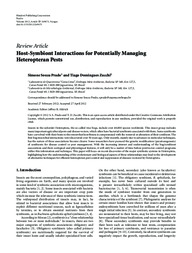Host-symbiont interactions for potentially managing heteropteran pests.
Host-symbiont interactions for potentially managing heteropteran pests.
Author(s): PRADO, S. de S.; ZUCCHI, T. D.
Summary: Insects in the suborder Heteroptera, the so-called true bugs, include over 40,000 species worldwide. This insect group includes many important agricultural pests and disease vectors, which often have bacterial symbionts associated with them. Some symbionts have coevolved with their hosts to the extent that host fitness is compromised with the removal or alteration of their symbiont. The first bug/microbial interactions were discovered over 50 years ago. Only recently, mainly due to advances in molecular techniques, has the nature of these associations become clearer. Some researchers have pursued the genetic modification (paratrangenesis) of symbionts for disease control or pest management. With the increasing interest and understanding of the bug/symbiont associations, and their ecological and physiological features, it will only be a matter of time before pest/vector control programs utilize this information and technique. This review will focus on recent discoveries of the major symbiotic systems in Heteroptera, highlighting how the understanding of the evolutionary and biological aspects of these relationships may lead to the development of alternative techniques for efficient heteropteran pest control and suppression of diseases vectored by Heteroptera.
Publication year: 2012
Types of publication: Journal article
Unit: Embrapa Environment
Keywords: Heteroptero, Hospedeiro, Plant pests, Praga de planta, Simbiose, Symbionts
Observation
Some of Embrapa's publications are published as ePub files. To read them, use or download one of the following free software options to your computer or mobile device. Android: Google Play Books; IOS: iBooks; Windows and Linux: Calibre.
Access other publications
Access the Agricultural Research Database (BDPA) to consult Embrapa's full library collection and records.
Visit Embrapa Bookstore to purchase books and other publications sold by Embrapa.

